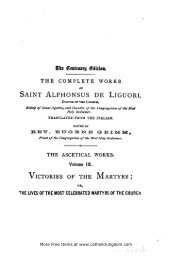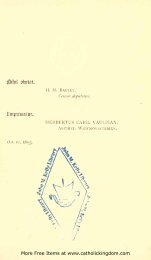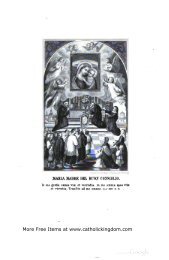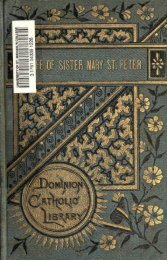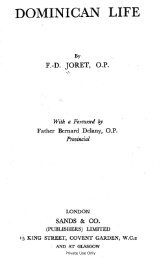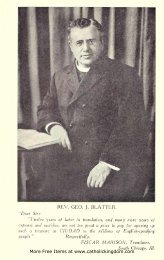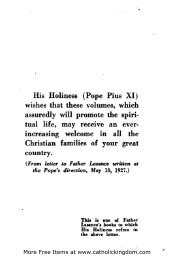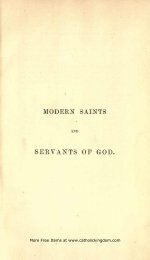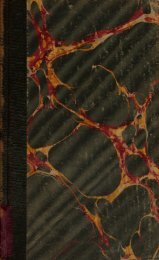Life of St. Rita of Cascia, O.S.A. - the Catholic Kingdom!
Life of St. Rita of Cascia, O.S.A. - the Catholic Kingdom!
Life of St. Rita of Cascia, O.S.A. - the Catholic Kingdom!
You also want an ePaper? Increase the reach of your titles
YUMPU automatically turns print PDFs into web optimized ePapers that Google loves.
ST. RITA RECEIVES HER MIRACULOUS WOUND[Frontispiece
@hi1 Qbsktt :FR. JOANNES L. CONDON, O.S.A.,CEN~. DEPUTATUS.PERMISSION TO PUBLISHWE approve <strong>of</strong> <strong>the</strong> publication <strong>of</strong> <strong>the</strong> ' <strong>Life</strong> <strong>of</strong><strong>St</strong>. <strong>Rita</strong> <strong>of</strong> <strong>Cascia</strong>.' from <strong>the</strong> Italian, by <strong>the</strong>Very Rev. Fr. Richard Connolly, O.S.A., D.D.FR. W. O'SULLIVAN, O.S.A.,VIUR PROVINCIAL.CORK, FCd <strong>of</strong> Sf. PPdri, 1903.Emprimafat% :HERBERTUS CARDINALIS VA~GHAN,AUCHI~PI~COPU~ WESTMONAST~R~~NS~S.More Free Items at www.catholickingdom.com
CHAPTERPAGEV. RITA'S OBSERVANCE OF THE RELIGIOUS VOWS - I10VI. RITA'S PENANCES - - I20VII. RITA'S SPIRIT OF PRAYER - 125VIII. A THORN FROM THE SAVIOUR'S CROWN OFTHORNS WOUNDS RITA'S FOREHEAD - - 132IX. RITA GOES TO ROME TO GAIN THE INDULGENCEOF THE JUBILEE . - - 137X. RITA'S LAST ILLNESS AND DEATH - - I42PART I11RITA IN HEAVENI. WONDERFUL EVENTS THAT HAPPENED AT RITA'SDEATH-BURIAL OF HER SACRED BODY -11. MIRACLES WROUGHT BY GOD THROUGH RITA'SINTERCESSION BEFORE HER BEATIFICATION -111. EFFICACY OF THE RELICS OF ST. RITA -IV. MARVELS OF ST. RITA'S SEPULCHRE -V. IMMEMORIAL WORSHIP OF ST. RITA -VI. SOLEMN BEATIFICATION OF RITAVII. MIRACLES WORKED BY RITA AFTER HER BEATI-FICATIONVIII. MORE RECENT MIRACLES OF ST. RITA -IX. HER CANONIZATIONX. THE THREE MIRACLES APPROVED FOR HERCANONIZATION -CONCLUSIONMore Free Items at www.catholickingdom.com
LIFE OF ST. RITA OF CASCIACHAPTER ICASCIA: A GLANCE AT ITS HISTORYT. BERNARD abserves that <strong>the</strong> place inS which our Saviour died attracts our devotionin a greater degree than any <strong>of</strong> those placesin which He dwelt during His life, and can <strong>the</strong>reforeboast <strong>of</strong> a certain pre-eminence. Speaking<strong>of</strong> <strong>St</strong>. <strong>Rita</strong>, we can say <strong>the</strong> same <strong>of</strong> <strong>Cascia</strong> comparedwith Rocca Porena, her birthplace. <strong>Cascia</strong>governed Rocca Porena as did Jerusalem Nazareth,but it is not on this account we claim its superiority,but because our saint lived <strong>the</strong>re for many yearsand died <strong>the</strong>re, and <strong>the</strong>re her relics are venerated.<strong>Cascia</strong> is <strong>the</strong>refore looked upon as <strong>St</strong>. <strong>Rita</strong>'shome, and hence she is called <strong>St</strong>. <strong>Rita</strong> <strong>of</strong> <strong>Cascia</strong>.Were we but to give a cursory sketch <strong>of</strong> <strong>the</strong> history<strong>of</strong> <strong>Cascia</strong> from its annals, which still exist, <strong>the</strong>present volume could not contain what we shouldMore Free Items at www.catholickingdom.com
e forced to write, so important did it become ;we will <strong>the</strong>refore content ourselves with alludingto a few <strong>of</strong> <strong>the</strong> more salient points in its story.This ancient and illustrious town is built under<strong>the</strong> shadow <strong>of</strong> <strong>the</strong> Apennin'es, at a point in thatchain <strong>of</strong> mountains almost midway between <strong>the</strong>Alps and <strong>the</strong> Mediterranean. It is on <strong>the</strong> borders<strong>of</strong> Umbria, seven miles from Norcia, ten fromLeonessa, thirty from Rieti, and twenty-threefrom Spoleto. It stands on <strong>the</strong> site <strong>of</strong> <strong>the</strong> ancientCursula, whigh is believed to have been a Romanfree-town-that is, its people enjoyed <strong>the</strong> honours,rights, and privileges <strong>of</strong> Roman citizenship, and<strong>the</strong>ir town was governed by its own laws. ThatCursula was a town <strong>of</strong> some importance is attestedby its remains, which are still extant, notably by<strong>the</strong> Temple <strong>of</strong> <strong>the</strong> Augurs, <strong>the</strong> Temple <strong>of</strong> Mars,and <strong>the</strong> House <strong>of</strong> <strong>the</strong> Duumviri.We have nothing else than <strong>the</strong>se remains toguide us in inquiring into <strong>the</strong> history <strong>of</strong> Cursula,nor can we surmise <strong>the</strong> epoch from whence to dateits existence. We know from ~ioi~sius <strong>of</strong> Halicamassusthat it was destroyed, and that a newtown rose on <strong>the</strong> ruins <strong>of</strong> <strong>the</strong> original one, but<strong>the</strong> dates <strong>of</strong> <strong>the</strong>se events cannot be fixed withcertainty. The date <strong>of</strong> <strong>the</strong> rebuildmg <strong>of</strong> Cursulamay, with some probability, be placed at somethingmore than ten years before <strong>the</strong> birth <strong>of</strong>Private Use Only
our Saviour, and hence its pagan inhabitantswere streng<strong>the</strong>ning <strong>the</strong> foundations <strong>of</strong> its futuregreatness when Jesus Christ, born in Bethlehem,was laying <strong>the</strong> foundation <strong>of</strong> <strong>the</strong> Redem$tion <strong>of</strong>man. We know, too, that it was a republic, butare left in <strong>the</strong> dark as to how it managed to achieveand preserve its independence. It is crediblethat, like o<strong>the</strong>r Italian cities, it acquired itsliberty at <strong>the</strong> time <strong>of</strong> <strong>the</strong> second fall <strong>of</strong> <strong>the</strong> RomanEmpire, after <strong>the</strong> death <strong>of</strong> <strong>the</strong> Emperor-SaintHenry, during <strong>the</strong> Pontificate <strong>of</strong> John XIX., orabout <strong>the</strong> year 1025. -This independence itretained till 1260,' in which year, through <strong>the</strong>ambition <strong>of</strong> rival leaders, <strong>the</strong> seeds <strong>of</strong> civicdissension were sown, and <strong>the</strong> republic was exposedto dangers from without. It was at thistime that <strong>the</strong> people <strong>of</strong> <strong>Cascia</strong> determined to put<strong>the</strong>mselves under, <strong>the</strong> authority <strong>of</strong> Alexander IV.,who <strong>the</strong>n occupied <strong>the</strong> Papal chair. They wereinduced to this action by what <strong>the</strong>y saw <strong>of</strong> <strong>the</strong>peaceful nature <strong>of</strong> <strong>the</strong> Papal government, andbecause <strong>the</strong>y adhered to <strong>the</strong> Guelph party, whichwas favourable to <strong>the</strong> Holy See. Alexander IV.was <strong>the</strong> great Pontiff who, uniting <strong>the</strong> greatestvirtues to <strong>the</strong> highest mental attainments, contrivedduring <strong>the</strong> height <strong>of</strong> <strong>the</strong> sanguinaryquarrels between Guelphs and Ghibellines, whichlxd for twenty years tom and divided Italy,More Free Items at www.catholickingdom.com
to stamp out incendiarism, to crush tyranny,and cause peace and happiness to flourish againin <strong>the</strong> distracted peninsula. <strong>Cascia</strong> had no reasonto regret <strong>the</strong> changed state <strong>of</strong> affairs, for <strong>the</strong>monarchical system which its submission to <strong>the</strong>Pope introduced by no means destroyed its republicanform <strong>of</strong> government. Hence it retained<strong>the</strong> right <strong>of</strong> regulating its own affairs by its ownlaws ; hence its mayor, elected every six months,retained his authority ; hence it retained thosechiefs <strong>of</strong> <strong>the</strong> people, at first called 'Ateposti,'<strong>the</strong>n ' Gonfalonieri,' and hally ' Consuls.' To<strong>the</strong>se latter a troop <strong>of</strong> soldiers, called <strong>the</strong> people'sjury, was subject, who had <strong>the</strong> duty not only <strong>of</strong>defending <strong>the</strong> people, but <strong>of</strong> acting on <strong>the</strong> <strong>of</strong>fensivewhen necessary. The court <strong>of</strong> justice, <strong>the</strong>guards and robes <strong>of</strong> <strong>the</strong> consuls, <strong>the</strong> stately retinue<strong>of</strong> <strong>the</strong> mayor, <strong>the</strong> fortifications with <strong>the</strong>ir garrisons,<strong>the</strong> number <strong>of</strong> subject towns and villages-<strong>of</strong>which more than forty recognise <strong>Cascia</strong> as <strong>the</strong>irchief at present, without speaking <strong>of</strong> <strong>the</strong> manywhich <strong>the</strong> ravages <strong>of</strong> time have destroyed-<strong>the</strong>right <strong>of</strong> peace and war left, at least in part, to <strong>the</strong>brave people <strong>of</strong> <strong>Cascia</strong>-<strong>the</strong>se and o<strong>the</strong>r memories<strong>of</strong> <strong>the</strong> past, which even now may be seen in <strong>the</strong>consular registers, constitute a pro<strong>of</strong> <strong>of</strong> <strong>the</strong>liberty which <strong>Cascia</strong> enjoyed under <strong>the</strong> Popesand <strong>of</strong> <strong>the</strong> fame which it acquired.iPrivate Use Only
But at <strong>the</strong> bepnhg <strong>of</strong> <strong>the</strong> disastrous andprolonged schism <strong>of</strong> <strong>the</strong> anti-Popes, <strong>Cascia</strong> unfurled<strong>the</strong> standard <strong>of</strong> rebellion, ei<strong>the</strong>r through adesire <strong>of</strong> complete independence, or, as some say,on account <strong>of</strong> <strong>the</strong> insolent conduct <strong>of</strong> <strong>the</strong> Papalsoldiers, and for a period <strong>of</strong> about 131 years--till <strong>the</strong> year 1517-it remained under a sort <strong>of</strong>mixed government. This interval <strong>of</strong> completeindependence was filled up by an uninterruptedseries <strong>of</strong> wars waged with its neighbours <strong>of</strong> Norcia,<strong>of</strong> Leonessa, <strong>of</strong> Monreale, <strong>of</strong> Aquila, or <strong>of</strong> Cerreto.But after <strong>the</strong> first outburst <strong>of</strong> enthusiasm forcomplete independence, and in <strong>the</strong> midst <strong>of</strong>quarrels with its neighbours, <strong>the</strong> republic <strong>of</strong><strong>Cascia</strong> took occasion to show its pristine reverenceand love for <strong>the</strong> See <strong>of</strong> Rome; A clear pro<strong>of</strong> <strong>of</strong><strong>the</strong> correspondence between <strong>Cascia</strong> and <strong>the</strong> Papal'See is <strong>the</strong> formal announcement, made by <strong>the</strong>Cardinals met toge<strong>the</strong>r in council at Constance,to <strong>the</strong> commune <strong>of</strong> <strong>Cascia</strong>, <strong>of</strong> <strong>the</strong> election <strong>of</strong> PopeMartin V. to <strong>the</strong> Pontifical throne. The promptassistance given by <strong>the</strong> people <strong>of</strong> <strong>Cascia</strong> toEugene IV., successor to Martin V., againstCorrado Trinci, Governor <strong>of</strong> Foligno, who triedta make himself lord and master <strong>of</strong> that city, isano<strong>the</strong>r pro<strong>of</strong> <strong>of</strong> <strong>the</strong>ir loyalty to <strong>the</strong> Holy See.When <strong>the</strong> wise and great-minded Leo X. ascended<strong>the</strong> Papal throne he brought back <strong>Cascia</strong> to itsMore Free Items at www.catholickingdom.com
CASCIA: A GLANCE AT ITS HISTORYi I5<strong>the</strong> Poli, Frenfanelli, Benenati, Cruciani, Squarcipani,Colangeli, Negroni, Graziani, Francexhini,Leonetti, Giudici, Elemosina, Girolami, Gregorietti,and <strong>of</strong> o<strong>the</strong>r illustrious families, would supplyample material to whosoever would wish to pronounce<strong>the</strong> praises <strong>of</strong> <strong>Cascia</strong>. We, who have forour study a nun and a saint, shall content ourselveswith going into <strong>the</strong> shadow <strong>of</strong> <strong>the</strong> cloisterand <strong>of</strong> <strong>the</strong> sanctuary. We find Andrew <strong>of</strong> <strong>Cascia</strong>,a Franciscan who lived at <strong>the</strong> same time as <strong>St</strong>.I<strong>Rita</strong>, who had <strong>the</strong> happiness <strong>of</strong> bringing <strong>the</strong>Gospel to <strong>the</strong> Turks at Fez, where he sufferedmartyrdom after converting many to Christ andworking many miracles. The glory <strong>of</strong> this humblefriar outshines <strong>the</strong> glory which <strong>the</strong> honours <strong>of</strong> <strong>the</strong>world can give. Blessed Pace, a Minor Conventual,born in <strong>Cascia</strong>, great in virtue and by <strong>the</strong>miracles he worked, raised himself above everyearthly greatness.But what must have most drawn <strong>the</strong> soul <strong>of</strong>our <strong>St</strong>. <strong>Rita</strong> to desire from her childhood <strong>the</strong> life<strong>of</strong> <strong>the</strong> cloister, and to follow it in her mature years,were <strong>the</strong> singular models <strong>of</strong> sanctity which <strong>the</strong>Augustinian institute in <strong>Cascia</strong> could furnish.The memory <strong>of</strong> <strong>the</strong> saintly heroes, followers <strong>of</strong><strong>the</strong> great Augustine, who dwelt in <strong>the</strong> woodsabout <strong>Cascia</strong>, was to her <strong>the</strong> memory <strong>of</strong> a recentevent. The first <strong>of</strong> <strong>the</strong>se recluses is Blessed J'ohn,iMore Free Items at www.catholickingdom.com
who from being lord <strong>of</strong> three towns shut himself<strong>the</strong> Valley <strong>of</strong> Attino, not far from <strong>Cascia</strong>, in ,order to lead a life hidden in God in <strong>the</strong> deepestconteqlation. Then comes Blessed Ugolino,who imitated <strong>the</strong> example <strong>of</strong> Blessed John inrenouncing <strong>the</strong> pleasant things <strong>of</strong> this world toengage himself entirely with heavenly thingsin <strong>the</strong> hermitage <strong>of</strong> <strong>St</strong>. Anatolia, in <strong>the</strong> territory<strong>of</strong> <strong>Cascia</strong>, where, living in misery, he prepared forhimself a way to a high degree <strong>of</strong> glory in heaven.The third is Blessed Simon Fidati, whom <strong>the</strong>shades <strong>of</strong> <strong>the</strong> hermitage could not hide from <strong>the</strong>world. For <strong>the</strong> books on <strong>the</strong> ascetic life whichthis very learned hermit <strong>of</strong> <strong>St</strong>. Augustine wrotein <strong>the</strong>se solitudes began to make him known ;<strong>the</strong>n his unwearying and fruitful preaching through<strong>the</strong> chief cities <strong>of</strong> Italy, especially Florence andSiena ; <strong>the</strong> conversions <strong>of</strong> which he was <strong>the</strong>instrument ; <strong>the</strong> number <strong>of</strong> enemies he reconciled ;his spirit <strong>of</strong> prophecy ; his unconquerable charityon most difficult occasions ; <strong>the</strong> foundation <strong>of</strong> two -monasteries in <strong>the</strong> city <strong>of</strong> Florence ; <strong>the</strong> o<strong>the</strong>rworks written by him, whence he deserved to bereckoned <strong>the</strong> brightest ornament <strong>of</strong> <strong>the</strong> AugustinianOrder at that time, both by his eloquenceand pr<strong>of</strong>ound learning, more infused than acquired,as well as for <strong>the</strong> piety and fervour whichanimated him in writing-<strong>the</strong>se and many o<strong>the</strong>rIPrivate Use Only
-nearly so, as Angelus and Louis <strong>of</strong> <strong>Cascia</strong>, CherubinusLavosi (Bishop <strong>of</strong> Telesia), Paoletti, Squarcipani,Amici, three <strong>of</strong> <strong>the</strong> Simonetti family-allei<strong>the</strong>r <strong>the</strong>ologians <strong>of</strong> some eminence or famouspreachers, or remarkable for <strong>the</strong>ir writings ; but-<strong>the</strong> notice <strong>of</strong> <strong>the</strong>se and <strong>of</strong> o<strong>the</strong>rs, however praiseworthyfor virtue or honourable to <strong>the</strong>ir nativecity <strong>of</strong> <strong>Cascia</strong>, might seem beside our purposeand be tedious to those who wish to read <strong>the</strong> life<strong>of</strong> <strong>St</strong>. '~ita. At all events, it may be deducedfrom what we have written that <strong>Cascia</strong> was not ,without honour in its history and in its inhabitants.I<strong>St</strong>ill, what is <strong>Cascia</strong> in <strong>the</strong> sight <strong>of</strong> God ?IWhat is even Jerusalem before Him and in <strong>the</strong>light <strong>of</strong> His inscrutable judgment ? Humangreatness, which dazzles our eyes, disappears in<strong>the</strong> glance <strong>of</strong> God, and is lost in its own nothingness.There is no distinction <strong>of</strong> persons withHim, nor is <strong>the</strong>re distinction <strong>of</strong> places. Thelittle town <strong>of</strong> Nazareth, out <strong>of</strong> which, in <strong>the</strong>common very poor opinion <strong>of</strong> it, it seemed nothinggood could come, was, in <strong>the</strong> Divine councils,preordained to be <strong>the</strong> fa<strong>the</strong>rland <strong>of</strong> <strong>the</strong> Saviour<strong>of</strong> <strong>the</strong> world ; and <strong>the</strong> still meaner town <strong>of</strong>Bethlehem--even a stable in Bethlehem-waschosen as His place <strong>of</strong> birth. Thus it <strong>of</strong>ten happensthat God chooses <strong>the</strong> weak things, <strong>the</strong> lowly, 1:Private Use Only
CASCIA : A GLANCE AT ITS HISTORY I9<strong>the</strong> despicable, <strong>the</strong> things <strong>of</strong> naught to confound<strong>the</strong> goodly things and <strong>the</strong> strong, and to workgreat designs, in order that <strong>the</strong> creature may nothave whence to vaunt himself before his Creator.Such was <strong>the</strong> case exactly with that humble spotRocca Porena, which was destined to be <strong>the</strong> birthplace<strong>of</strong> <strong>St</strong>. <strong>Rita</strong>.To give some idea <strong>of</strong> it, let us say it is two miles .and a half from <strong>Cascia</strong> towards <strong>the</strong> west, whereit is closed in, not to say buried. An overhangingI mountain crushes it in on all sides and dominatesit, and with difficulty gives access to it from <strong>the</strong>east by two narrow roads, one on ei<strong>the</strong>r side <strong>of</strong> aprecipitous rock. The river which flows to <strong>the</strong>base <strong>of</strong> this rock, famous in <strong>the</strong> life <strong>of</strong> <strong>the</strong> saint,does not approach <strong>the</strong> small piece <strong>of</strong> level groundwhich, toge<strong>the</strong>r with <strong>the</strong> village, forms <strong>the</strong> bottom<strong>of</strong> a deep basin. The sun is tardy <strong>the</strong>re in rising,Iand sets early, leaving <strong>the</strong> barren plain to itslangour and sadness. One would say that a1 place so isolated and confined, where nei<strong>the</strong>r <strong>the</strong>I beauty <strong>of</strong> nature nor <strong>of</strong> art appears, and where<strong>the</strong> sky is almost <strong>the</strong> only thing in view, wasI created for contemplation and to be <strong>the</strong> home <strong>of</strong>innocence. The two houses <strong>of</strong> <strong>St</strong>. <strong>Rita</strong> are stillto be seen, almost at opposite ends <strong>of</strong> <strong>the</strong> village,<strong>the</strong> one in which she was born and lived until hermarriage in that part called <strong>the</strong> Borghetto, and?cZMore Free Items at www.catholickingdom.com
CHAPTER I1IIIIFTHE fortunate parents <strong>of</strong> <strong>Rita</strong> were AntonioMancini, <strong>of</strong> Rocca Porena and Amata Ferri,who is believed to be from a village called Fogliano.Antonio was not noble, nor had he a title, butwe may apply to him <strong>the</strong> praise which <strong>the</strong> HolySpirit gives to Noah-that he was a just manand perfect in his times, and he walked withGod. The Gracchi, <strong>the</strong> Scipios, <strong>the</strong> karsamong <strong>the</strong> number <strong>of</strong> <strong>the</strong>ir family honourscannot find a title greater or even equal to this.Every o<strong>the</strong>r superiority is vanity, and if <strong>the</strong>rebe glory from o<strong>the</strong>r titles, it is <strong>the</strong> glory <strong>of</strong> ano<strong>the</strong>r,which cannot pass to <strong>the</strong> posterity <strong>of</strong> those whomerited it. Justice alone makes that real nobilitywhich <strong>St</strong>. Augustine and o<strong>the</strong>r holy fa<strong>the</strong>rs dallnobility according to <strong>the</strong> heart <strong>of</strong> God. Andalthough even this cannot be passed on to descendants,as it did not pass from Noah to hisson Cham, whom he cursed, yet it is not unusual, [ZI ]More Free Items at www.catholickingdom.com
for God to recall <strong>the</strong> justice <strong>of</strong> parents, not onlyfor a model, but to give a certain extrinsic gloryto <strong>the</strong>ir descendants. Hence, when <strong>the</strong> HolySpirit wished to record <strong>the</strong> praises <strong>of</strong> <strong>St</strong>. John<strong>the</strong> Baptist, He wished also for his honour thatwe should remember that his parents were both' just before God, walking in all <strong>the</strong> commandmentsand justifications <strong>of</strong> <strong>the</strong> Lord withoutblame.' So we can also say <strong>of</strong> Antonio and Amata,<strong>of</strong> whom was born <strong>St</strong>. <strong>Rita</strong>, who had a specialdevotion to <strong>St</strong>. John. They were not <strong>of</strong> nobleblood, but <strong>the</strong>y were noble in <strong>the</strong>ir works ; <strong>the</strong>ywere not rich in temporal goods, but <strong>the</strong>y wererich in <strong>the</strong> true treasures <strong>of</strong> Divine grace, whichdo not pass from those who possess <strong>the</strong>m, Theyenjoyed <strong>the</strong> esteem <strong>of</strong> all who knew <strong>the</strong>m, anesteem more precious than that which flattery<strong>of</strong>fers to <strong>the</strong> rich and great <strong>of</strong> this world. Theirfortune constituted that mediocrity which <strong>the</strong>wise man sought from God in order that abundancemight not tempt him to forget his Creator, norpoverty to give himself a prey to any vice. Theindustrious and honourable labour, and <strong>the</strong> innocentpastoraI life which in <strong>the</strong>ir time did notdegrade <strong>the</strong> Patriarchs Abraham, Isaac, andJacob, did not make <strong>the</strong> Mancini family lessworthy <strong>of</strong> honour. Ra<strong>the</strong>r from <strong>the</strong> fruits <strong>of</strong><strong>the</strong>ir labour did <strong>the</strong>y acquire <strong>the</strong> means <strong>of</strong> exer-Private Use Only
cising a beneficent liberality towards <strong>the</strong> poor <strong>of</strong>Jesus Christ, whom <strong>the</strong>y cherished with an ardentcharity. Whe<strong>the</strong>r <strong>the</strong> fruits <strong>of</strong> <strong>the</strong>ir fields wereabundant or scarce, . <strong>the</strong>se two happy ones,husband and wife, lived contented in <strong>the</strong>irfrugality, always giving thanks to <strong>the</strong> Giver <strong>of</strong>every good gift, and placing <strong>the</strong>mselves entirelyin conformity with <strong>the</strong> most just and providentialdispositions <strong>of</strong> heaven. Perfect concord, whichwas <strong>the</strong>ir dearest virtue, since in it is <strong>the</strong> fulness<strong>of</strong> <strong>the</strong> law, always reigned in <strong>the</strong>ir home. Andhence when <strong>the</strong>y heard <strong>of</strong> divisions amongsto<strong>the</strong>rs, which were only too frequent in that ageand country, <strong>the</strong>y were speedily present with<strong>the</strong>m, and with <strong>the</strong>ir insinuating manners andholy zeal <strong>the</strong>y insisted in <strong>the</strong>ir charitable <strong>of</strong>ficestill peace was restored. They were, on thisaccount, commonly called <strong>the</strong> ' peacemakers <strong>of</strong>Jesus Christ.'They corrected <strong>the</strong> erring according to <strong>the</strong> rules<strong>of</strong> <strong>the</strong> Gospel ; <strong>the</strong>y interceded for <strong>the</strong>m with s<strong>of</strong>ervent prayers, with so great concern, and withso happy results, that, like Moses, <strong>the</strong>y appearedto be constituted mediators between <strong>the</strong> peopleand God. They steadily hated vice, and practisedevery virtue. The book from which <strong>the</strong>ylearned and cherished sentiments so virtuouswas none o<strong>the</strong>r than <strong>the</strong> Passion <strong>of</strong> <strong>the</strong> Redeemer.More Free Items at www.catholickingdom.com
It furnished <strong>the</strong>m with inexhaustible matter for<strong>the</strong>ir meditations, for <strong>the</strong>ir liveliest -compassion,and for that remarkable piety which, from hercradle, <strong>the</strong>y instilled into <strong>the</strong> heart <strong>of</strong> <strong>Rita</strong>, andwhich <strong>the</strong>y left her as a heritage. In a word, itmay with reason be said <strong>of</strong> <strong>the</strong>m what was said<strong>of</strong> <strong>the</strong> parents <strong>of</strong> <strong>St</strong>. John <strong>the</strong> Baptist-that <strong>the</strong>ywere both just to <strong>the</strong> eyes <strong>of</strong> God, walking withoutstain in <strong>the</strong> exact observance <strong>of</strong> <strong>the</strong> law. Thiswas <strong>the</strong>ir nobility, this was <strong>the</strong>ir wealth, whichit pleased God to pass to <strong>the</strong>ir daughter and tomultiply in her in a singular way. Thus we maysay, as Blessed Simon <strong>of</strong> <strong>Cascia</strong> writes, that <strong>the</strong>parents' goodness instilled <strong>the</strong> best dispositionseven before her birth into her who was to be bornfrom <strong>the</strong>m, as <strong>the</strong> goodness <strong>of</strong> Zachary andElizabeth went to exalt <strong>the</strong> holy precursor <strong>St</strong>.John.Thus <strong>the</strong>se two holy souls, husband and wife,lived a long series <strong>of</strong> years in <strong>the</strong>se exercises <strong>of</strong>virtue and piety, without, however, seeing anyfruit <strong>of</strong> <strong>the</strong>ir chaste union. God so disposed itthat <strong>the</strong> desires <strong>of</strong> <strong>the</strong>ir youthful years should bevain, that <strong>the</strong>y should labour to detach <strong>the</strong>irminds still more from mortal things, and in orderthat <strong>the</strong> pro<strong>of</strong>s <strong>of</strong> an extraordinary work <strong>of</strong> Hisprovidence should one day shine <strong>the</strong> brighter.Meanwhile, <strong>the</strong>ir desire <strong>of</strong> <strong>of</strong>fspring, with whichPrivate Use Only
IIInature innocently inspired <strong>the</strong>m, had not onlygrown cold with advancing years, but was quiteextinct ; no o<strong>the</strong>r care should remain with <strong>the</strong>mnow than that <strong>of</strong> ascending to <strong>the</strong> eternal heritage<strong>of</strong> <strong>the</strong> heavenly Fa<strong>the</strong>r, instead <strong>of</strong> descendmg to<strong>the</strong> care <strong>of</strong> children and transmitting <strong>the</strong>ir temporalpossessions to <strong>the</strong>ir posterity on earth.More Free Items at www.catholickingdom.com
as <strong>the</strong> sanctity <strong>of</strong> <strong>the</strong> Baptist was likewise foretoldto Zachary.The miraculous pledge <strong>of</strong> grace which Antonio'shappy wife bore already in her womb and her livelyfaith prevented her from smhg at announcementsso wonderful; unlike Abraham's wife, whosmiled at a not dissimilar announcement. Nordid she sin through incredulity, as did Elizabeth'shusband, who was punished for his sin, butforewarned by fact, and full <strong>of</strong> that faith whichteaches that God can raise up children to Abrahameven from <strong>the</strong> vwy stones, she instantly believedin <strong>the</strong> words <strong>of</strong> <strong>the</strong> angel. The angelic visiondisappeared, and Amata, considering her ownunworthiness, was seized with fresh wonder andpr<strong>of</strong>ound humility. Thinking at <strong>the</strong> same timeon <strong>the</strong> signal favour, she retired, with great contentmentand singular gratitude and love towards<strong>the</strong> Divine goodness, to pour out <strong>the</strong> fulness <strong>of</strong>her pure and fervent affection at <strong>the</strong> feet <strong>of</strong> hermost beneficent God. It is easy to think what anew stimulus to piety in herself and her virtuoushusband was this great grace. Thus <strong>the</strong>y remainedhappy in <strong>the</strong>ir virtue and secure in <strong>the</strong>hands <strong>of</strong> Divine providence, joyously awaiting<strong>the</strong> happy day <strong>of</strong> <strong>Rita</strong>'s extolled birth.More Free Items at www.catholickingdom.com
CHAPTER IVNOW that we are about to describe <strong>Rita</strong>'sbirth, it will not be out <strong>of</strong> place to casta passing glance at <strong>the</strong> unhappy state <strong>of</strong> thosetimes, in order to see things more clearly as weprogress with our history, and in order that <strong>the</strong>providence <strong>of</strong> God and His grace may moreclearly be discerned to His honour and glory.The memories are still fresh in our minds, or,ra<strong>the</strong>r, <strong>the</strong> wounds which <strong>the</strong> avenging sword <strong>of</strong><strong>the</strong> God <strong>of</strong> armies inflicted on us. There is nota moment in which we do not recall with horror<strong>the</strong> mournful losses inflicted by arms on property,commerce, arts, study, families, <strong>St</strong>ates, goodorder, morals, on religion and <strong>the</strong> Church. Buthowever true and just our regrets may be, itis a fact that Italy was much more harassedand aficted at <strong>the</strong> period about <strong>the</strong> birth <strong>of</strong><strong>Rita</strong>. To read <strong>of</strong> <strong>the</strong> extortions <strong>of</strong> <strong>the</strong> Viscontithrough <strong>the</strong> wide extent <strong>of</strong> <strong>the</strong>ir dominions in[ 30 1Private Use Only
Lombardy, <strong>the</strong> cruelty exercised by <strong>the</strong>m on<strong>the</strong> pretext <strong>of</strong> punishing treason, <strong>the</strong>ir unbridledlust, and <strong>the</strong>ir most unworthy harassing <strong>of</strong> <strong>the</strong>clergy, excites our horror. At <strong>the</strong> o<strong>the</strong>r extremity<strong>of</strong> Italy, in <strong>the</strong> kingdom <strong>of</strong> Naples, a temtory<strong>of</strong> equal importance, wrongs and scandals <strong>of</strong> everydescription, and <strong>the</strong> most deplorable calamities,caused by <strong>the</strong> parties <strong>of</strong> <strong>the</strong> Dukes <strong>of</strong> Anjouand Surazzo, who laid claim to <strong>the</strong> kingdom,spread <strong>the</strong>mselves and took root as <strong>the</strong> civilwar that followed on <strong>the</strong> death <strong>of</strong> King Robertbecame more widespread. The different o<strong>the</strong>r1 <strong>St</strong>ates into which Italy was <strong>the</strong>n divided were notanything better. For <strong>the</strong> luxury <strong>of</strong> <strong>the</strong>se littleCourts which tried to rival <strong>the</strong> great ones to <strong>the</strong>grave oppression <strong>of</strong> <strong>the</strong> people, <strong>the</strong>ir despotism,<strong>the</strong>ir rivalry and wars, <strong>the</strong>ir unbridled ambitionto command which multiplied <strong>the</strong> domestictreasons and assassinations <strong>of</strong> bro<strong>the</strong>rs bybro<strong>the</strong>rs, <strong>of</strong> relatives by relatives (if we except <strong>the</strong>houses <strong>of</strong> Savoy, Monferrato, Saluzzo, and Este)-<strong>the</strong>se and <strong>the</strong> o<strong>the</strong>r dominant vices and scandalsserved only to increase misery and sorrow. The?cities <strong>of</strong> <strong>the</strong> Papal <strong>St</strong>ates were also, for <strong>the</strong> mostpart, groaning under <strong>the</strong> yoke <strong>of</strong> rebels-bloody,inexorable, lewd tyrants-and especially beforeGregory IX. re-established his throne in Romeafter his return from Avignon. And, as if <strong>the</strong>seMore Free Items at www.catholickingdom.com
Italian tyrants were not sufficient to cause publicmisery, hordes <strong>of</strong> devastating soldiers issued fromGermany, Hungary, and England to complete<strong>the</strong> confusion. Warner, Muriale, Sando, Anchino,Augustus, and o<strong>the</strong>rs-all captains <strong>of</strong> <strong>the</strong> dissolutesoldiers <strong>of</strong> fortune-were <strong>the</strong> stubborn arbiters <strong>of</strong>Italian affairs from <strong>the</strong> middle <strong>of</strong> <strong>the</strong> fourteenthcentury till <strong>the</strong> time <strong>of</strong> Charles V., although <strong>the</strong>ywere not owners <strong>of</strong> even a perch <strong>of</strong> land. Thesegave <strong>the</strong>ir services in <strong>the</strong> perpetual wars to whoeverpaid <strong>the</strong>m best, and went about pillaging,imposing tribute and subsidies-and woe to himwho was slow in satisfying <strong>the</strong>ir demads !-laying waste fields, besieging towns, and universallyexercising <strong>the</strong>ir pitiless power. Hence, as<strong>the</strong> people model <strong>the</strong>mselves after <strong>the</strong> manners <strong>of</strong>kings and nobles, it is easy to divine <strong>the</strong> generalstate <strong>of</strong> morals in <strong>the</strong> midst <strong>of</strong> such depravity.Let us draw a veil over that picture, <strong>the</strong> sight <strong>of</strong>which would move to horror humanity, religion,and especially modesty.Let it suffice to say that so deeply rooted wasthis universal depravity that not even <strong>the</strong> pestilence,that so evident sign <strong>of</strong> <strong>the</strong> anger <strong>of</strong> heaven,which in <strong>the</strong> middle <strong>of</strong> that century carried <strong>of</strong>fmore than half <strong>the</strong> inhabitants <strong>of</strong> Italy, was ableto check it. And that which <strong>the</strong> prophet Isaiasseems to have foreseen in his time, but in ano<strong>the</strong>rPrivate Use Only
sense, was fulfilled here too: such as <strong>the</strong> peopleis, so 'shall <strong>the</strong> priest be-so strong was <strong>the</strong>influence <strong>of</strong> <strong>the</strong> bad example and want <strong>of</strong> disciplineintroduced into Italy by <strong>the</strong> abandoning<strong>of</strong> <strong>the</strong>ir Apostolic See in Rome by <strong>the</strong> Popes.The prevailing depravity afterwards opened <strong>the</strong>way to still greater evils.For <strong>the</strong> zeal with which Urban VI., successor<strong>of</strong> Gregory XI., sought to remedy <strong>the</strong> evilswhich aacted <strong>the</strong> Church was intolerable to some,and hence followed <strong>the</strong> election <strong>of</strong> an ~nti-Pope,which gave rise to that terrible schism whichburst forth a little before <strong>the</strong> birth <strong>of</strong> <strong>Rita</strong>, andended only a short time before her death.Who can recall without tears <strong>the</strong> separationsbetween friends, princes taking opposing sides,<strong>the</strong> spiritual and temporal arms put in antagonism,<strong>the</strong> neglect <strong>of</strong> <strong>the</strong> canons, <strong>the</strong> numberless scandalsand losses <strong>of</strong> <strong>the</strong> Church, which would at that timehave been threatened with absolute ruin, butthat <strong>the</strong> gates <strong>of</strong> hell can never prevail against<strong>the</strong> unshakable edifice founded on <strong>the</strong> rock <strong>of</strong>Peter, which can never fail ? The Church was atthat time, moreover, filled with sorrow by <strong>the</strong>.heresies <strong>of</strong> <strong>the</strong> Beguins, <strong>the</strong> Flagellants, <strong>the</strong>Adarnites, <strong>the</strong> Waldensians, <strong>the</strong> Wickliffites, ando<strong>the</strong>rs, and by <strong>the</strong> rapid successes <strong>of</strong> Amurath I.,who, to <strong>the</strong> loss <strong>of</strong> <strong>the</strong> Christian name, took3More Free Items at www.catholickingdom.com
possession <strong>of</strong> Thessaly and Macedonia about <strong>the</strong>time <strong>of</strong> <strong>Rita</strong>'s birth. Nei<strong>the</strong>r in <strong>the</strong> Eastern norin <strong>the</strong> Western Church was <strong>the</strong>re an Emperorei<strong>the</strong>r fitted to oppose a bulwark against <strong>the</strong>inrush <strong>of</strong> such evils or disposed to oppose <strong>the</strong>m.John Paleologus in <strong>the</strong> East had lost heartthrough his frequent defeats, and was leaguedagainst <strong>the</strong> powers <strong>of</strong> Christendom; and in <strong>the</strong>West, Wenceslaus, given to <strong>the</strong> wine-cup and toluxury, was become good for nothing.The republics <strong>of</strong> <strong>the</strong> time, amongst which was<strong>Cascia</strong>, were not much more fortunate than <strong>the</strong>kingdoms. Genoa and Venice, which only ashort time previous might have been comparedin <strong>the</strong>ir rivalry to Rome and Carthage in <strong>the</strong>ancient world, had now both become exhausted<strong>of</strong> all <strong>the</strong>ir strength through a long series <strong>of</strong> stubbornwars undertaken against one ano<strong>the</strong>r, andalthough <strong>the</strong>y were now mutually at peace and alsowith <strong>the</strong> o<strong>the</strong>r Powers, through <strong>the</strong> intervention<strong>of</strong> <strong>the</strong> Duke <strong>of</strong> Savoy, <strong>the</strong>y were unable to showany opposition to <strong>the</strong> common enemy <strong>of</strong> Christendom.Nor did <strong>the</strong> avarice and ambition <strong>of</strong> <strong>the</strong>se<strong>St</strong>ates fail to bring in <strong>the</strong>ir train a fruitful crop<strong>of</strong> all o<strong>the</strong>r vices. Florence, too, although happyin <strong>the</strong> cultivation <strong>of</strong> <strong>the</strong> fine arts, was infectedwith <strong>the</strong> general depravity. The city was tomby faction, and weakened by those o<strong>the</strong>r vices1IIIPrivate Use Only
against which Blessed Simon <strong>of</strong> <strong>Cascia</strong> had sostrenuously preached a few years earlier. Andalthough <strong>the</strong>se exhortations brought about areform, it was but half-hearted and short-lived.Vicious practices increased in <strong>the</strong> city, and openrebellion against <strong>the</strong> Holy See was <strong>the</strong>ir eventualoutcome. Of <strong>Cascia</strong> itself we read that in 1380 <strong>the</strong>Guelphs and <strong>the</strong> Ghibellines committed horribleatrocities throughout <strong>the</strong> city and its dependentterritory. And although <strong>the</strong> opposing factionspatched up a peace between <strong>the</strong>m in that year,it was <strong>of</strong> no long duration, since, as we have saidin <strong>the</strong> first chapter, <strong>the</strong> people <strong>of</strong> <strong>Cascia</strong> rebelled! against <strong>the</strong> Holy See during <strong>the</strong> first years <strong>of</strong> <strong>the</strong>schism <strong>of</strong> <strong>the</strong> anti-Popes, just after <strong>the</strong> birth <strong>of</strong><strong>Rita</strong>. Murder and robbery, pillage and incendiarismfollowed in <strong>the</strong> wake <strong>of</strong> rebellion, andbrought ruin to many families in <strong>Cascia</strong> anddestruction upon her religious places. A warI.soon broke out between <strong>Cascia</strong> and Leonessa,which lasted for twelve months, and would havecontinued much longer but for <strong>the</strong> friendly intervention<strong>of</strong> <strong>the</strong> Trinci <strong>of</strong> Foligno, through whoseefforts peace was made. Such was <strong>the</strong> wretchedcondition <strong>of</strong> affairs in Italy at that time.It is truly wonderful, as <strong>St</strong>. John Chrysostomsays <strong>of</strong> a somewhat similar case, how so fair arose as <strong>St</strong>. <strong>Rita</strong> was could have bloomed amid so3-2More Free Items at www.catholickingdom.com
many thorns. Yet such was <strong>the</strong> disposition <strong>of</strong>Divine providence, which decreed that where sinsuperabounded grace should abound in that chosensoul who, from <strong>the</strong> miraculous events that precededher birth and her innocence, which shepreserved intact, seemed almost to have beensanctified in her mo<strong>the</strong>r's womb. <strong>Rita</strong>, <strong>the</strong>n,was born in <strong>the</strong> village <strong>of</strong> Rocca Porena in <strong>the</strong>year 1381, during <strong>the</strong> pontificate <strong>of</strong> Urban. Herparents were Antonio Mancini and Amata Ferri,<strong>the</strong> child <strong>of</strong> whose old age she was, <strong>the</strong> first andonly fruit <strong>of</strong> <strong>the</strong>ir chaste love, or, ra<strong>the</strong>r, <strong>of</strong> <strong>the</strong>irremarkable virtue. The pure joy which filledAmata's heart at <strong>the</strong> sight <strong>of</strong> <strong>the</strong> infant, whichheaven itself had extolled, must have made herforget those trials which every mo<strong>the</strong>r has experiencedsince our first mo<strong>the</strong>r Eve committedoriginal sin. Antonio, too, as he gazed tenderlyon <strong>the</strong> predestined child, must have exultedin<strong>the</strong> Lord, and must, like Simeon <strong>of</strong> old, have felthimself ready to die content ; he, too, could nowsing a hymn <strong>of</strong> thanksgiving to God, who hadgranted him <strong>the</strong> happiness <strong>of</strong> seeing <strong>the</strong> glory <strong>of</strong>his family, <strong>of</strong> his country, and <strong>of</strong> <strong>the</strong> new house<strong>of</strong> Israel. The general joy and universal congratulation<strong>of</strong> relatives and neighbours added to <strong>the</strong>happiness <strong>of</strong> <strong>the</strong> pious couple, whose virtue andcharity had made <strong>the</strong>m esteemed by all. ThusqPrivate Use Only
did <strong>the</strong> relatives and neighbours <strong>of</strong> <strong>the</strong> holyElizabeth rejoice at <strong>the</strong> equally wonderful birth<strong>of</strong> <strong>St</strong>. John <strong>the</strong> Baptist, for <strong>the</strong> Lord desired tomake known <strong>the</strong> mercy he had shown in <strong>the</strong>first appearance <strong>of</strong> <strong>the</strong> Precursor. ' All who lovegoodness,? says Simon <strong>of</strong> <strong>Cascia</strong>, ' participate in<strong>the</strong> joy that is occasioned by <strong>the</strong> birth <strong>of</strong> onedestined to live for <strong>the</strong> common good.' Thosewho rejoice in grace, and in <strong>the</strong> sight <strong>of</strong> <strong>the</strong> fruits<strong>of</strong> justice, must let <strong>the</strong>ir sentiments be evident.to all, as in <strong>the</strong> present case, in which apious mo<strong>the</strong>r brought forth a saintly child. Itis part <strong>of</strong> <strong>the</strong> spiritual life to be pleased at <strong>the</strong>prosperity <strong>of</strong> o<strong>the</strong>rs, and to rejoice with thoseespecially who have been marked by <strong>the</strong> favour<strong>of</strong> <strong>the</strong> Omnipotent God.Meanwhile, <strong>the</strong> parents <strong>of</strong> <strong>the</strong> newly-borninfant, in <strong>the</strong> midst <strong>of</strong> <strong>the</strong>se rejoicings, werepondering on what name <strong>the</strong>y should call her,and again that God, who had by an angel announcedher birth, again in a vision <strong>of</strong> <strong>the</strong> nightmade <strong>the</strong>m know that <strong>Rita</strong> was to be her name.It is a rare privilege <strong>of</strong> some saints, remarks <strong>St</strong>.Arnbrose, to deserve to get <strong>the</strong>ir names from GodHimself. Thus Jacob was named Israel by <strong>the</strong>Lord, thus was <strong>the</strong> Baptist named John by <strong>the</strong>angel, thus <strong>the</strong> Eternal Fa<strong>the</strong>r called <strong>the</strong> Wordmade flesh by <strong>the</strong> name Jesus before He was born,More Free Items at www.catholickingdom.com
and thus did she who was to imitate <strong>the</strong> virtues<strong>of</strong> <strong>the</strong> Baptist and be a faithful follower <strong>of</strong> JesusChrist get her name from heaven. The name<strong>Rita</strong>, as being quite an unusual name, must havebeen meant to signify <strong>the</strong> sanctity that was tomark <strong>the</strong> life <strong>of</strong> <strong>the</strong> child so designated, and ifwe were to give credence to <strong>the</strong> opinion <strong>of</strong> <strong>the</strong>Augustinian author Didacus, <strong>Rita</strong> signifies virtueand grace.But this name foreshadowed only what <strong>Rita</strong>was to be, not what she was. For although shecould be considered from <strong>the</strong>n as a child <strong>of</strong> Godin <strong>the</strong> order <strong>of</strong> predestination, yet according to<strong>the</strong> order <strong>of</strong> nature, and according to her actualstate, she was, owing to original sin, a child <strong>of</strong>wrath; and to become an adopted child <strong>of</strong> Godshe needed to be cleansed from <strong>the</strong> hereditarystain <strong>of</strong> original sin in <strong>the</strong> sanctifying waters <strong>of</strong><strong>the</strong> Redeemer. Her baptism took place on <strong>the</strong>fourth day after her birth, although we maybelieve her pious parents wished her to be baptizedwith all possible speed, and from <strong>the</strong> delaywe may conclude that <strong>the</strong> time <strong>of</strong> her birth musthave been in <strong>the</strong> winter season. There was nobaptismal font at that time in Rocco Porena, and<strong>the</strong> child had <strong>the</strong>refore to be taken to <strong>the</strong> collegiatechurch <strong>of</strong> <strong>St</strong>. Mary in Gascia, where that gracewhich was to be <strong>the</strong> beginning and <strong>the</strong> seal <strong>of</strong> herPrivate Use Only
sanctification awaited her. There <strong>Rita</strong> put <strong>of</strong>f<strong>the</strong> garb <strong>of</strong> sin, and came forth from <strong>the</strong> salutarybath <strong>of</strong> baptism clo<strong>the</strong>d in <strong>the</strong> garment <strong>of</strong> innocenceand enriched with <strong>the</strong> gifts <strong>of</strong> <strong>the</strong> HolyGhost, who from <strong>the</strong> moment chose her to be Hisspouse. Thus did <strong>the</strong> regenerated babe return toher mo<strong>the</strong>r's bosom and <strong>the</strong> joyful embraces <strong>of</strong>her parents, fairer to <strong>the</strong> eyes <strong>of</strong> faith than herbeauty made her to <strong>the</strong> eyes <strong>of</strong> men.More Free Items at www.catholickingdom.com
CHAPTER VwTHE WHITE BEES OF ST. RITAHEN <strong>the</strong> godmo<strong>the</strong>r and her attendantsreturned from <strong>Cascia</strong> after <strong>the</strong> baptism,a feast was prepared for <strong>the</strong>m and <strong>the</strong> relatives <strong>of</strong><strong>the</strong> happy parents, to celebrate in a manner becoming<strong>the</strong>ir humble position <strong>the</strong> double birth<strong>of</strong> <strong>Rita</strong> in <strong>the</strong> order <strong>of</strong> nature and <strong>of</strong> grace.Meanwhile, <strong>the</strong> child had closed her eyes in atranquil slumber. When <strong>the</strong> next day dawned,<strong>the</strong> fifth day <strong>of</strong> her existence, a swarm <strong>of</strong> bees,all <strong>of</strong> <strong>the</strong> fairest white colour, and such as werenever before seen, made <strong>the</strong>ir appearance. Theyflew a-buzzing about <strong>the</strong> cradle <strong>of</strong> <strong>the</strong> child, andafter alighting for a moment on her angelic facewere seen to go in and come out <strong>of</strong> her slightlyopen mouth in a sort <strong>of</strong> regular order, as if totake from her lips <strong>the</strong> honey <strong>of</strong> Paradise. Whatfeelings <strong>of</strong> wonder and awe must have beenawakened in <strong>the</strong> heart <strong>of</strong> Amata and those whowere present by so marvellous an occurrence 


